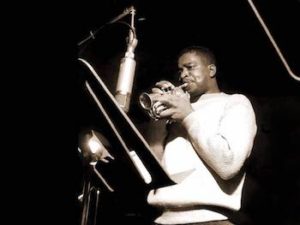
Donald Byrd
*Donald Byrd was born on this date in 1932. He was a Black jazz musician and music educator.
From Detroit, MI., Donaldson Toussaint L’Ouverture Byrd II was the son of E. T. Byrd, a Methodist minister. Two years in the Air Force, he interrupted his music studies at Wayne State University. After serving his country, he received a bachelor’s degree from Wayne State and moved to New York. Here, Byrd began his jazz career earnestly and received a master’s in music education from the Manhattan School of Music.
Almost from arriving in New York City in 1955, Byrd was at the center of the movement known as hard bop, a bebop variation that emphasized jazz’s blues and gospel roots. Known for his pure tone and impeccable technique, he performed or recorded with some prominent jazz musicians, including John Coltrane, Thelonious Monk, Sonny Rollins, and Art Blakey. As a bandleader, Byrd was sometimes a talent scout, too. One of the first to hire a promising young pianist named Herbie Hancock, who, like Byrd, would later be called a renegade for an approach that won a wide audience but displeased many critics. A lifelong interest in education parallelled his musical pursuits.
Byrd, a strong advocate of music education, spent much of the 1960s teaching. He taught jazz at Howard University, North Carolina Central University, Rutgers, Cornell, the University of Delaware, and Delaware State University and studied law. Then, in 1973, he made a surprising transition to pop fame with the album “Black Byrd,” produced by the brothers Larry and Fonce Mizell, who had been his students at Howard University in Washington. With Byrd’s restrained licks (he played both trumpet and fluegelhorn) layered over an irresistible funk groove seasoned with wah-wah guitar and straightforward, repeated lyrics (“Get in the groove, just can’t lose”), “Black Byrd” reached the Billboard Top 100.
Byrd was hardly the first jazz musician to try such a crossover: Miles Davis had achieved a similar musical synthesis with “Bitches Brew” three years earlier. But “Black Byrd,” unlike “Bitches Brew,” was overtly pop-oriented, and its success was extremely rare for a jazz musician. It became, and for a long time, the best-selling album in the history of Blue Note Records, the venerable jazz label Mr. Byrd had been recording since the 1950s. “Then the jazz people starting eating on me,” Byrd recalled in a 1982 radio interview. “They had a feast on me for ten years: ‘He’s sold out.’ Everything that’s bad was attributed to Donald Byrd. I weathered it, and then it became commonplace. Then, they found a name for it. They started calling it ‘jazz fusion,’ ‘jazz-rock. ”
The critique did not stop him from making more pop records. In addition to recording as a leader, he organized some of his Howard students into a group called the Blackbyrds and produced their records. The band had a string of hit singles in the 1970s, including “Walking in Rhythm,” which reached the Top 10 on the pop charts, and “Rock Creek Park,” which evoked late-night romance in a wooded park in Washington, D.C. “Rock Creek Park” became something of a local anthem and one of many recordings by Byrd to be sampled by rap and hip-hop artists, including Public Enemy, Nas, and Ludacris.
His music and the Blackbyrds have been sampled more than 200 times, with the 1975 album “Places and Spaces” among his most frequently repurposed recordings. In 1982, he received a doctorate in education from Teachers College at Columbia University. He spent many years at various institutions, teaching a curriculum that integrated math and music education.
In his 1998 Cornell lecture, Byrd said he had been inspired by musicians who changed music, notably John Coltrane. “I met him in the 11th grade in Detroit,” he said. “I skipped school one day to see Dizzy Gillespie, and that’s where I met Coltrane. Coltrane and Jimmy Heath just joined the band, and I brought my trumpet, and he was sitting at the piano downstairs waiting to join Dizzy’s band. He had his saxophone across his lap, and he looked at me and he said, ‘You want to play?’ “So he played piano, and I soloed. I never thought that six years later, we would be recording together and that we would be doing all of this stuff. The point is that you never know what happens in life.”
In 2000, the National Endowment gave Byrd a Jazz Masters Award for the Arts. Donald Byrd died on February 9, 2013.